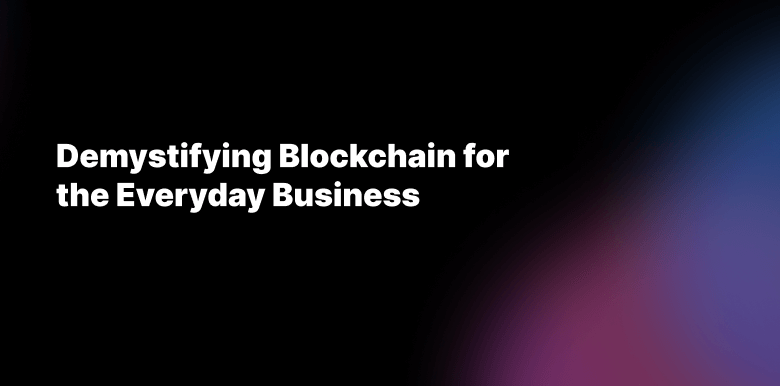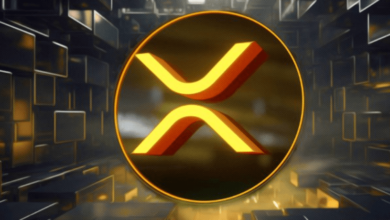Demystifying Blockchain for the Everyday Business

Are you feeling overwhelmed by the buzz around blockchain technology and its potential impact on the business world? You’re not alone. As this revolutionary technology continues to evolve, understanding how it can streamline operations, enhance security, and transform traditional business models is becoming increasingly crucial for companies of all sizes.
The integration of blockchain is no longer a futuristic concept; it’s a present-day reality that is reshaping the landscape of modern business, offering unprecedented opportunities for growth and innovation. In the ever-expanding digital economy, the quest for efficiency, transparency, and trust is leading businesses to explore the myriad benefits of blockchain.
From revolutionizing supply chain management to enabling faster, cost-effective transactions, blockchain stands at the forefront of business evolution. It’s not just about cryptocurrency; it’s about leveraging smart contracts to automate and secure business agreements, dispelling myths that have long surrounded the technology, and examining real-world success stories across various industries.
As we delve into the transformative power of blockchain, we’ll also provide you with actionable insights to prepare your business for a seamless transition into the blockchain era, ensuring you stay ahead of the curve in this dynamic digital age.
Exploring the Impact of Blockchain on Modern Business Operations
The integration of blockchain technology into modern business operations has been transformative, offering a level of security and transparency previously unattainable. Companies across various industries are leveraging blockchain to streamline processes, reduce fraud, and create a more trustworthy environment for transactions. For instance, supply chain management has seen a significant overhaul with blockchain’s ability to provide real-time, immutable tracking of goods from origin to consumer, ensuring authenticity and compliance.
Financial transactions, traditionally bogged down by lengthy verification processes and intermediaries, are now experiencing unprecedented efficiency thanks to blockchain. The technology enables peer-to-peer transactions that are not only faster but also incur lower fees, making it an attractive option for businesses looking to optimize operational costs. Moreover, smart contracts automate and enforce agreements without the need for third-party oversight, further reducing expenses and potential for human error.
Adopting blockchain technology requires careful consideration and planning. A checklist for businesses might include: assessing the compatibility with existing systems, understanding regulatory requirements, ensuring data privacy, and evaluating the scalability of the solution. By methodically addressing these points, businesses can harness the full potential of blockchain, driving innovation and maintaining a competitive edge in today’s digital landscape.
Unlocking the Potential of Blockchain for Enhanced Security and Trust
Businesses across various sectors are increasingly recognizing the transformative power of blockchain technology. By leveraging its inherent features, companies can achieve unprecedented levels of security and trust in their transactions and data management. Blockchain’s decentralized nature ensures that information is not stored in a central location, making it less vulnerable to hacking and fraud. Moreover, the use of cryptographic hashing and consensus algorithms creates an immutable record of transactions, which is essential for maintaining data integrity and preventing unauthorized alterations.
Blockchain’s potential extends beyond mere data security; it fosters trust in business ecosystems. Here are some key points illustrating this advantage:
- Transparency: Every transaction on the blockchain is recorded on a public ledger, visible to all participants. This transparency holds parties accountable and builds trust among users.
- Reduced Counterparty Risk: Smart contracts automate transactions without the need for intermediaries, reducing the risk of fraud and default.
- Enhanced Verification Processes: Blockchain’s verification mechanisms ensure that all transactions are validated by multiple nodes, which mitigates the risk of tampering and error.
By integrating these features, businesses can not only secure their operations but also establish a more trustworthy environment for their clients and partners.
Streamlining Supply Chain Management with Blockchain Technology
Efficiency and transparency are paramount in modern supply chain management. Blockchain technology offers a robust solution to enhance traceability and reduce inefficiencies. By creating a decentralized ledger that is accessible to all parties involved, blockchain ensures that every transaction or movement of goods can be recorded and verified. This level of detail provides businesses with an unprecedented ability to monitor their supply chain in real-time, leading to improved operational efficiency and reduced costs associated with errors and fraud.
One of the most significant advantages of blockchain in supply chain management is the elimination of intermediaries. Traditionally, third-party verification has been a necessary but costly part of ensuring the authenticity and legality of transactions. Blockchain’s inherent properties allow for secure and direct interaction between parties, fostering a more streamlined process. This direct approach not only speeds up transactions but also enhances the security of sensitive data, as the risk of breaches is minimized when fewer parties have access to the information.
Adopting blockchain technology can also lead to greater consumer trust. In an era where consumers are increasingly concerned with the ethical sourcing and sustainability of the products they purchase, blockchain provides an immutable record of the product journey. From raw materials to the final product, each step can be traced and validated, offering consumers the transparency they demand. This level of detail can be a significant differentiator for businesses looking to establish themselves as responsible and trustworthy in the eyes of their customers.
Simplifying Transactions: How Blockchain Facilitates Faster and Cheaper Processes
Streamlining operations is a key objective for any business looking to stay competitive. Blockchain technology offers a transformative approach to handling transactions, cutting through the red tape that often bogs down traditional methods https://www.ulam.io/software-services/blockchain-software-development. By eliminating intermediaries, blockchain can significantly reduce transaction times from days to mere minutes or even seconds. This efficiency is not just theoretical; it’s evident in sectors like finance, where blockchain-based systems like Ripple can settle cross-border payments almost instantaneously compared to the standard waiting period associated with conventional banking systems.
Cost reduction is another compelling advantage of blockchain. Traditional transaction methods often involve multiple parties, each taking a slice of the pie in fees. Blockchain’s peer-to-peer nature slashes these costs dramatically. For example, a comparison between sending international remittances through banks and blockchain platforms reveals stark differences. Banks can charge anywhere from $25 to $50 for international wire transfers, while blockchain-powered services like Stellar can reduce the cost to mere cents. This is not just beneficial for businesses but also for consumers who are seeking more economical options.
Moreover, the security and immutability inherent in blockchain transactions provide businesses with a level of assurance that is hard to match. Once a transaction is recorded on a blockchain, it cannot be altered, which significantly reduces the risk of fraud and errors. For instance, a comparison between traditional supply chain management systems and blockchain-based solutions shows that the latter can enhance traceability and accountability, leading to fewer discrepancies and increased trust among all parties involved. Companies like Walmart have already begun leveraging blockchain to track produce from farm to shelf, ensuring food safety and quality for their customers.
The Role of Smart Contracts in Automating Business Agreements
Smart contracts represent a transformative leap in how companies can conduct transactions and enforce agreements. By leveraging the immutable and decentralized nature of blockchain technology, these digital contracts execute predefined rules automatically when certain conditions are met. This automation eliminates the need for intermediaries, such as lawyers or banks, which traditionally have been necessary to validate and enforce business agreements. As a result, smart contracts can significantly reduce transaction costs and streamline business processes, making them an invaluable tool for businesses looking to improve efficiency.
In the realm of contract management, smart contracts offer an unprecedented level of security and trust. The terms of the agreement are encoded into the blockchain, making them virtually tamper-proof and ensuring that all parties can have confidence in the contract’s execution. This level of security is particularly beneficial in scenarios where trust is paramount, such as in supply chain management or intellectual property rights. Moreover, the self-executing nature of smart contracts means that they can facilitate real-time settlement of transactions, which is a game-changer for industries that require speed and accuracy in their operations.
Despite their potential, the adoption of smart contracts is not without challenges. One significant hurdle is the current undefined legal status in many jurisdictions, which can create uncertainty for businesses. Additionally, while smart contracts are designed to be self-sufficient, they still require accurate and timely input of data, which can be a point of vulnerability if the data sources are not reliable. Nonetheless, as the technology matures and regulatory frameworks evolve, it is expected that smart contracts will become a cornerstone of modern business practices, offering a level of efficiency and security that traditional contracts simply cannot match.
Overcoming Common Misconceptions About Blockchain in Business
Many professionals harbor the misconception that blockchain technology is solely about cryptocurrencies, such as Bitcoin or Ethereum. However, its applications extend far beyond digital currencies. Blockchain offers a decentralized ledger that can enhance security, improve traceability, and reduce costs through its immutable and transparent nature. While these features present significant advantages, businesses must also consider the potential downsides. The technology can be complex to implement, and the current regulatory environment remains uncertain, which may pose challenges for widespread adoption in certain industries.
Another common fallacy is that blockchain is a panacea for all business inefficiencies. While blockchain can streamline processes like supply chain management, it is not universally applicable or beneficial for every type of transaction or data management scenario. Companies should weigh the pros and cons carefully, considering factors such as the necessity for speed in transactions and the importance of interoperability with existing systems. On the upside, blockchain can offer increased security and reduced instances of fraud, but on the downside, it may require significant upfront investment and technical expertise to deploy effectively.
Lastly, there is a belief that blockchain is inherently unscalable and too slow for practical business use. This stems from early blockchain implementations that were not designed for high-speed or high-volume transactions. However, with the advent of newer technologies like sidechains and sharding, blockchain is evolving to meet the demands of modern enterprises. Businesses should stay informed about these advancements, as they can provide solutions to scalability issues and open up new opportunities for leveraging blockchain in a variety of commercial applications.
Real-World Applications: Case Studies of Blockchain in Various Industries
Exploring the financial sector, blockchain technology has revolutionized the way transactions are processed. Major banks and financial institutions have adopted blockchain to enhance security and reduce costs associated with cross-border payments. For instance, JP Morgan Chase implemented their own digital coin, JPM Coin, to facilitate instantaneous payment transfers between institutional accounts. This case study exemplifies blockchain’s potential to streamline financial operations, providing a blueprint for other businesses considering similar integrations. Tip sheets for financial businesses could include best practices for blockchain implementation and strategies to educate staff on this new technology.
In the realm of supply chain management, blockchain’s ability to provide an immutable ledger has been a game-changer. Companies like Walmart have partnered with IBM to utilize blockchain for tracking food products through their complex supply chain. This has significantly improved the traceability of goods, enhancing food safety and reducing waste. By providing a transparent and tamper-proof system, blockchain has enabled businesses to gain consumer trust and optimize logistics. Tip sheets for supply chain professionals might cover the steps for integrating blockchain into existing systems and how to leverage the data for improved decision-making.
The healthcare industry has also seen transformative applications of blockchain technology. By creating secure and unchangeable patient records, healthcare providers can ensure data integrity and improve the coordination of care. A notable example is the collaboration between Guardtime and the Estonian eHealth Foundation, which secures over one million patient health records. This initiative showcases how blockchain can be used to protect sensitive information and streamline patient care across different service providers. Healthcare organizations could benefit from tip sheets that outline the ethical considerations and regulatory compliance aspects of using blockchain in patient data management.
Preparing Your Business for Blockchain Integration: Steps to Get Started
Embarking on the journey of blockchain integration requires a strategic approach to ensure compatibility with existing business processes. It is essential to begin by conducting a comprehensive audit of your current systems to identify potential areas of improvement or necessary upgrades. This assessment will help you understand the scope of changes needed and the resources required for a smooth transition. Additionally, educating your team about blockchain technology and its implications on your business operations is a critical step. Providing training sessions and resources can empower your employees to become adept at handling the new technology, fostering an environment of innovation and readiness for change.
Once the groundwork has been laid, the next step involves choosing the right blockchain platform that aligns with your business objectives. This decision should be informed by factors such as scalability, security, and the level of customization available. Engaging with blockchain experts and consultants can provide valuable insights and help you navigate the plethora of options in the market https://www.ulam.io/. Furthermore, it’s important to develop a phased implementation plan that allows for iterative testing and refinement. Starting with a pilot project or a proof of concept can demonstrate the tangible benefits of blockchain to stakeholders and pave the way for wider adoption across the organization.
In conclusion, preparing your business for blockchain integration is a multifaceted process that demands careful planning and execution. By thoroughly assessing your current systems, educating your team, selecting the appropriate blockchain platform, and adopting a phased approach, you can set the stage for a successful integration. The benefits of blockchain, such as enhanced security, improved efficiency, and increased transparency, can be substantial, but they require a commitment to continuous learning and adaptation. As the technology evolves, staying abreast of the latest developments and best practices will ensure that your business remains at the forefront of innovation.




